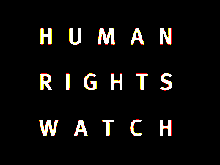 Human Rights Watch disseminated its annual report summarizing human rights conditions in more than 90 countries and territories worldwide. It reflects extensive investigative work undertaken in 2009 by Human Rights Watch.
Human Rights Watch disseminated its annual report summarizing human rights conditions in more than 90 countries and territories worldwide. It reflects extensive investigative work undertaken in 2009 by Human Rights Watch.
“Azerbaijan’s human rights record further deteriorated,” it is noted in the report. “A February 2009 referendum on constitutional amendments abolished presidential term limits. The government continued to use defamation and other criminal charges to intimidate and punish journalists and bloggers expressing dissenting opinions. New amendments to the religion law restrict freedom of conscience. Other serious problems persist, including torture and ill-treatment in police custody, political prisoners, and harassment of human rights defenders.”
A 612 page report covering 90 countries allocated 5 pages to Azerbaijan, of which half has been dedicated to the press freedom and civil society.
“Since November 2008 at least nine independent or pro-opposition journalists and editors were convicted on criminal libel or defamation charges,” the report reads. “The government failed to meaningfully investigate several incidents of violence and threats against journalists. In December 2008 the National Television and Radio Council banned the transmission of foreign radio stations via FM frequencies, making them accessible only through satellite receiver or the internet. The February 2009 constitutional amendments ban the audio recording, filming, or photographing of a person without his or her consent, seriously hampering investigative journalism in Azerbaijan. March amendments to the mass media law allow the government to request a court to suspend a media outlet for up to two months for several reasons, including failure to send free obligatory copies to “relevant government bodies.”
“In August Novruzali Mammadov, editor-in-chief of Talyshi Sado newspaper, died in custody apparently after the government failed to provide him with adequate treatment for health problems,” reads the section dedicated to torture and ill-treatment.
Post soviet countries Russia, Armenia, Belarus, Uzbekistan, Turkmenistan, Kyrgyzstan, and Kazakhstan are also included on the list of the countries that violate human rights. The situation in Ukraine and Georgia is not characterized as good in the report either.
A 612 page report covering 90 countries allocated 5 pages to Azerbaijan, of which half has been dedicated to the press freedom and civil society.
“Since November 2008 at least nine independent or pro-opposition journalists and editors were convicted on criminal libel or defamation charges,” the report reads. “The government failed to meaningfully investigate several incidents of violence and threats against journalists. In December 2008 the National Television and Radio Council banned the transmission of foreign radio stations via FM frequencies, making them accessible only through satellite receiver or the internet. The February 2009 constitutional amendments ban the audio recording, filming, or photographing of a person without his or her consent, seriously hampering investigative journalism in Azerbaijan. March amendments to the mass media law allow the government to request a court to suspend a media outlet for up to two months for several reasons, including failure to send free obligatory copies to “relevant government bodies.”
“In August Novruzali Mammadov, editor-in-chief of Talyshi Sado newspaper, died in custody apparently after the government failed to provide him with adequate treatment for health problems,” reads the section dedicated to torture and ill-treatment.
Post soviet countries Russia, Armenia, Belarus, Uzbekistan, Turkmenistan, Kyrgyzstan, and Kazakhstan are also included on the list of the countries that violate human rights. The situation in Ukraine and Georgia is not characterized as good in the report either.
To view the full report: http://www.hrw.org/world-report-2010

